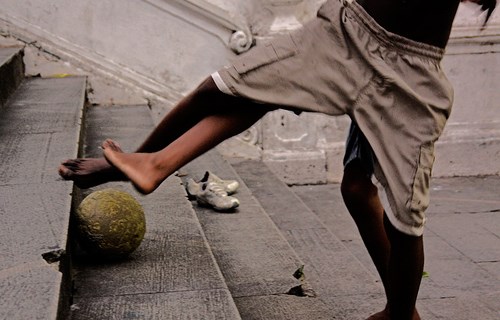Play the Game 2015: Transfers and trafficking: The human cost of broken dreams
Millions of less privileged children and adolescents – and their relatives – believe that a career in sport can lift them out of poverty. Unscrupulous agents and clubs in the sports industry thrive on an endless supply of muscle and talent, leaving young and inexperienced individuals as social waste in big cities. Talented children are often fair game, for sale at tiny amounts at an increasingly young age.
Jean-Claude Mbvoumin has had talented children and young players like these close to his life since 2000, when he founded FootSolidaire.
FootSolidaire is an organisation that helps and protects young players who have been left behind by agents’ false promises of prosperity or who need help securing their rights. Mbvoumin will share his knowledge and give delegates an insight on what type of pitfalls players can run into and on what he sees as a meaningful way to avoid them.
A responsible labour market?
International and national sports federations insist that rules and protections systems are difficult to implement. The protection of sporting youth largely depends on the willingness of clubs, investors and agents to volunteer information, and the sports transfer market is believed to be a heaven for tax evasion, whitewashing and corruption
Play the Game 2015 will put focus on how we can monitor the transfer of human beings and turn professional sport into a responsible labour market.
Recently, FIFA banned third party ownership (TPO) of players in a move to help secure the right of the athlete. As a former director of the European Professional Football Leagues, Emanuel Macedo de Medeiros, now CEO of The International Centre for Sport Security – Europe, will be able to give the clubs’ version on what they do to ensure athletes’ rights.
Some argue that the young Africans are not only victims of unscrupulous exploitation, but often seek a career in sport as a rational choice made with their eyes open to the risks. Professor of Cultural Anthropology at the University of Amsterdam, Niko Besnier, and some of his students will add an alternative perspective on the life of the young migrants and their relatives.
Workers’ rights and migration
As an athlete, retirement often comes early and if you what to succeed, there is not much time for education alongside practice. So how can an athlete secure him or herself that there is a life after sport? Zenon Severis from the EU’s sport unit, will speak about what the EU does to ensure that athletes can embark on a more ‘normal’ life after their sports career has ended.
In a globalised world, athletes may have to migrate across borders to take up work and leading this type of life shapes a human’s life. Associate professor Sine Agergaard has been researching the athletic and nonathletic implications of migrating for sport and will present some of the dilemmas that athletes are faced with in terms of lifestyle.
In short: Play the Game 2015 sets out to create an overview and seek solutions to strengthen the rights of athletes regardless of age.






